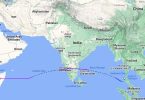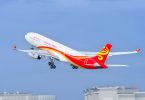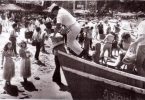It’s an easy trip to make and the yen is relatively strong, but Japan’s tourist industry is finding the Summer Games to be a big disappointment.
Olympic excitement in Japan is high as the country’s team tries to match its record gold-medal haul of 16 in Athens four years ago. With the opening ceremonies of the Beijing Olympics just days away, you would expect flights to China to be chock-full of Japanese sports aficionados. It’s not as if the Japanese aren’t Olympics fans. In 2000, when the Games were last held in the Asia-Pacific region, plenty of Japanese tourists made the trip to Sydney. Unlike tourists from the U.S. or Europe, Japanese don’t have to take a long-haul flight to get to this year’s games. And their currency’s relative strength means tourists won’t get fleeced when converting yen to yuan. Political relations between China and Japan are the best they’ve been in years, with President Hu Jintao making the first visit by a Chinese head of state to Tokyo in May.
But the Olympics are turning out to be a big letdown for Japan’s tourist industry. All Nippon Airways and Japan Airlines are expecting to fill fewer seats on flights to China this summer. ANA Sales, a subsidiary of All Nippon Airways, predicts a 10% decline in the number of travelers compared with last year, while JAL anticipates a sharper 20% drop. “We expected the Beijing Olympics would offer a good business opportunity for us,” says Shunsuke Narizumi, overseas travel division manager at Nippon Travel Agency, “but things have been disappointing (BusinessWeek.com, 8/1/08).
What’s keeping the Japanese away? Some blame the repercussions of a series of negative news stories about China. For instance, on Aug. 4 police beat and detained two Japanese journalists covering the suspected terrorist attack in Western China that killed 16 people. Although Chinese officials expressed their regrets, the news has further damaged the image of the country to many Japanese. Earlier this year, Japanese media headlines were dominated by a food-poisoning incident involving pesticide-tainted dumplings (BusinessWeek.com, 2/6/08) imported from China.
Ugly Incidents
More recently, Japanese have focused on news about demonstrations in Tibet, protests surrounding the Olympic torch relay, and the fallout from the Sichuan earthquake. “These incidents have damaged China’s image,” says Yuko Sawaki, a spokesperson at ANA Sales. Many Japanese also haven’t forgotten an ugly incident involving their soccer team in 2004. After China’s national team lost to Japan in Beijing, hundreds of Chinese supporters threw bottles, shouted obscenities, burned Japanese flags, and surrounded the Japan team’s bus.
The dwindling number of tourists can’t all be blamed on the Olympics. The number of Japanese travelers to China has dropped acutely this year. ANA Sales marked a 40% drop in sales of China tours in the past six months from the previous year’s level. Nippon Travel Agency’s sales for China also dropped 50% in the past six months compared with the last year. Travel agency JTB is expecting a 37% decrease in sales of trips to China this summer (from July 15 to Aug. 31) compared with the previous year.
One major problem now is a serious shortage of tickets. Experts say the host country usually allocates 50% of the tickets to sponsors and overseas markets, but Beijing has kept three-fourths of the total 7 million tickets for domestic use. “I’ve got some telephone calls from the Games sponsors looking for tickets. I heard that some Japanese athletes’ fan clubs, including their family members, have problems getting tickets, too,” says Nippon Travel’s Narizumi.
After months of negotiation, the Japan Olympic Committee (JOC) managed to get 70,000 tickets, only half of what it had requested. This is more than the 50,000 the JOC received for Athens but far fewer than the 160,000 for the Seoul Olympics in 1988.
Pollution-Free Training
ANA Sales is one of the eight travel agents commissioned by the JOC to sell these tickets. At present, the company has sold 70% of the sales target, in terms of the number of customers, and 80% of the tickets. The unsold tickets are for the events in which Japanese athletes are not likely to win, such as track and field. “It is very difficult to get a ticket for popular events like judo, gymnastics, and swimming,” says ANA Sales’ Sawaki. In the case of judo, for instance, the company has 50 tickets for the preliminary rounds but 10 for the finals. “You can’t tell a customer to watch only the early rounds and then go back to the hotel to see the finals,” says Sawaki. “It’s a hard sell.”
JOC spokesman Seiji Ishikawa says Japan’s allocation of 70,000 is far more than other countries. He admits there are many tickets for events such as baseball that are not popular in Europe, but the number of tickets for the high-profile indoor events is limited. “It is difficult to get as many tickets for popular events as we would like,” says Ishikawa.
There’s one group of travelers certain to make the trip from Japan. Amid persistent concern about pollution in Beijing, nearly 20 countries have sent their Olympic teams to Japan (BusinessWeek.com, 2/12/08) for last-minute training. In Fukuoka, Japan, for instance, 140 Swedish and 30 Dutch athletes are making final adjustments and preparations before competing. The members of the Swedish Olympic Committee first went to the city in February 2005; since then, coaches and athletes have visited Fukoka 12 times. “As it is very convenient to travel between the international airport and hotels and practice grounds/facilities, athletes will have little strain,” says Kikuhiro Takenaka of Fukoka’s sports department. The flight from Fukuoka to Beijing is a bit over four hours but requires a changeover in the eastern Chinese cities of Dalian or Qingdao. There used to be a direct flight to Beijing, but Air China, the state-owned Chinese airline, scrapped it last month because of a lack of interest from passengers.






















